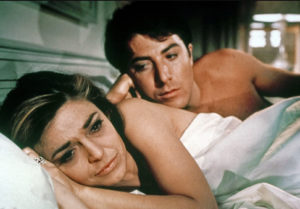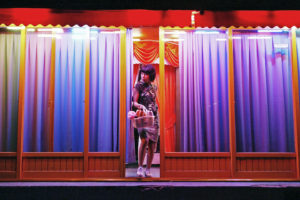“When I am an old woman I shall wear purple,” wrote Jenny Joseph in her poem, “Warning”. “With a red hat that doesn’t go and doesn’t suit me”.
She describes a dream of growing old disgracefully, as a reward for being well-behaved. For now, we must “pay our rent and not swear in the street / And set a good example for the children”. When the proper age for being respectable is over, though, the poet vows to “go out in my slippers in the rain / And pick flowers in other people’s gardens”.
Though “Warning”, written in 1961, was voted Britain’s most popular postwar poem in one poll, it didn’t drive a surge in merrily misbehaving old matrons — at least not in the style she envisaged. Instead, at least judging by the press, older women get more invisible by the day. The lack of substantial acting roles for older women is so marked that a campaign to change it received Equity backing last year. And many women over 50 complain about feeling pushed aside and pushed out of the workplace.
A widely-trailed movie, out this week, seeks to challenge this narrative. Good Luck To You, Leo Grande is a two-hander in which Emma Thompson plays Nancy, a widowed schoolteacher in her early sixties, who hires handsome young rentboy Leo Grande (Daryl McCormack). The film documents their interactions over a number of meetings, as Nancy sets out to tick off a list of sexual experiences she never enjoyed with her late husband.
In this, it takes aim at a common experience described by older women: that as far as wider social perception is concerned, as women age we’re no longer seen as valuable. There’s some truth in this, at least at the superficial level of who gets ogled on the beach. According to the founder of dating website OKCupid, while women’s view of what’s attractive changes as we age, men of every age tend to rate women in their early twenties as looking the best.
Exceptionally beautiful women must feel this keenly. Paulina Porizkova, once the world’s most highly-paid model, clearly does: she told The Times earlier this year how she just doesn’t seem able to pull any more. “I am now completely invisible,” she says. “I walk into a party, I try to flirt with guys and they will just walk away from me mid-sentence to pursue someone 20 years younger. I’m very single, I’m dressed up, I’ve made an effort — nothing.”
There is, in other words, something robustly consistent about what induces men to stop what they’re doing and stare at a woman. The fact that the age of maximum perceived female hotness coincides with the age of peak fertility strongly implies that it has a material basis, something recognised by writer Ayelet Waldman: “I remember reading some study that men can sense a woman who’s fertile, and they focus their laser beam eyes on a fertile woman,” she said. “Well, as soon as you’re not fertile anymore, it’s like they just skip over you.”
Surely this should be so obvious as not to need spelling out. The fact that it isn’t tells us something about how uncomfortable we’ve become at the idea that our bodies impose any constraints at all. And it’s often self-styled feminist women who push hardest against the constraints of sex, challenging the idea that women should be seen as fertile first and people second. Meanwhile, academics and activists alike call for us to envision brave new worlds of sex wholly disconnected from reproduction.
In this context, Leo Grande has been widely celebrated as empowering. Stuff the idea that our bodies constrain us, and that we stop being sexual later in life, it declares — we’ve moved past imagining that sex and fertility are connected at all. Older women can also want, need and enjoy pleasure!
But in reality, older women are, in this sense, far from invisible. A recent poll announced that the age at which women feel hottest is in fact 53; campaigns such as Rock My Menopause and GenM encourage positive representation of menopausal women, and articles celebrate the joys of dating older women.
The same desire to resist the constraints of biology lurks behind another common theme: the celebration of older people engaging in activities stereotypically associated with youth — especially the “sexy” ones. Last week, for example, the Guardian published an enthusiastic profile of the Sun City Poms, a troop of retiree cheerleaders in Arizona. Last year, a retirement-home pole-dancing class made the news.
Desire, we gather, doesn’t have a sell-by date, and older people still get horny; the French are here as ever, with advice on shagging, the NYT is here as ever to take photos of you doing it. And if you end up catching an STI in the process, there are papers on the need to “educate” healthcare professionals to stop assuming sexual health for retirees is just about Viagra.
But while it’s of course true that older people get horny, in truth the premise of Leo Grande doesn’t challenge what’s behind female invisibility at all. Rather, it entrenches it. For it has very little to offer all those women for whom not having to be sexy any more is not a bug, but a feature. If, unlike the Paulina Porizkovas of this world, you’re among the far larger body of women who’ve made something other than looks the focus of your life, you may well find it a blessed relief when the gaze of male strangers begins to skip you in favour of younger, perkier women. In that context there are many upsides to ageing, including dressing for comfort, men talking to your face rather than your boobs, and (joy!) having lunch solo without being buttonholed by horny weirdos.
In her 1992 feminist classic, Women Who Run With The Wolves, Jungian analyst Clarissa Pinkola Estés argued that moving on from youthful hotness is part of a specifically female life path. For those women who have kids (as some 82% do in the UK), she suggests, life is archetypally divided into three stages: maiden, mother and crone. The “maiden” child-free stage coincides, roughly, with the moment of peak fertility that the data shows is so captivating to men. In time, though, that ordinarily gives way to motherhood, a different life-stage with its own role-models and obligations: constricting in some ways but opening doors to new experiences and wisdom. And once the kids are grown up, so begins a new phase of life: the crone.
This figure, well-represented in ancient mythology, is the role Jenny Joseph looks gleefully forward to: wise and mischievous, trailing her walking stick along the railings, and kicking over all those little ways she worked dutifully before to uphold moral norms. Why shouldn’t she eat three pounds of sausages in one go? The crone can do as she pleases, for she’s done her time setting a good example and has the wisdom to show for it. So now she can pick flowers from other people’s gardens and tell children off for misbehaving.
Leo Grande’s Nancy is a mother on the threshold of cronehood. But instead of donning purple and stepping across to a new stage of life, she longs for something that is, in truth, irreversibly lost: a return to hotness and freshness. Maidenhood. “I’ve never had an orgasm,” she sighs. “There are nuns out there with more sexual experience than me, it’s embarrassing.”
So she buys the illusion of that return from a prostitute. This is, we’re told, a sweet, healing, “sex-positive romance”: “empowerment” as pure transaction, that somehow turns out to be emotionally fulfilling, and not at all exploitative or squalid. The “liberating” message it offers is that even frumpy, wrinkly, saggy middle-aged women who have devoted their lives to public service and their loved ones are not wholly beyond redemption. They, too, can access hedonistic, self-centred gratification, thanks to the sex industry.
Er, thanks.
In the real world, someone like Nancy would be very unlikely to do something as cold, transactional and empty as buying the sexual services of a man young enough to be her son. A retired teacher in her sixties, husband deceased and children grown up, would far more plausibly lean into a busy cronehood doing what many perimenopausal women do: beginning a new career.
I’ve known women in late middle age retrain as therapists, run voluntary groups, read with kids in schools, become priests. The possibilities are infinite. These are the women whose quiet dedication keeps communities turning. For countless individuals, the everyday, humdrum life from which Nancy is shown liberating herself is rich with joy on its own terms.
But far from celebrating older women, Leo Grande dismisses the vast bulk of everyday female experience as meaningless, miserable drudgery. “I’ve never done anything interesting in my life,” Nancy laments in the film. “You’re the only adventure I’ve ever had.”
It would have been nice, just once, to see a movie depict a female hero’s journey on its own terms. But from the perspective of movie-land, such things are profoundly unsexy. If you made a film that accurately depicted a thoughtful, conventional bourgeois woman like Nancy, taking stock of her life in middle age after decades of giving herself as a wife and mother, it would be “art-house” at best.
So the central message of Leo Grande is that it’s all downhill from maidenhood — but despite this miserable prospect, even frumpy women on the cusp of cronehood can avail ourselves of the “sexual marketplace” to return, however briefly, to the far more desirable state of maidenhood.
But this is a lie, as even Porizkova, once the world’s highest-paid model, can attest. And framing this lie as a positive story means dismissing everything that’s rewarding about any average woman’s life, except the stage where she was young and hot. In other words: setting middle-aged women up to fail, by making everything about us invisible except the sexiness we no longer have. I can’t think of a more insidious, and contemptuous, way of making us disappear.
Disclaimer
Some of the posts we share are controversial and we do not necessarily agree with them in the whole extend. Sometimes we agree with the content or part of it but we do not agree with the narration or language. Nevertheless we find them somehow interesting, valuable and/or informative or we share them, because we strongly believe in freedom of speech, free press and journalism. We strongly encourage you to have a critical approach to all the content, do your own research and analysis to build your own opinion.
We would be glad to have your feedback.
Source: UnHerd Read the original article here: https://unherd.com





